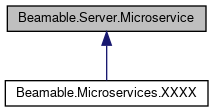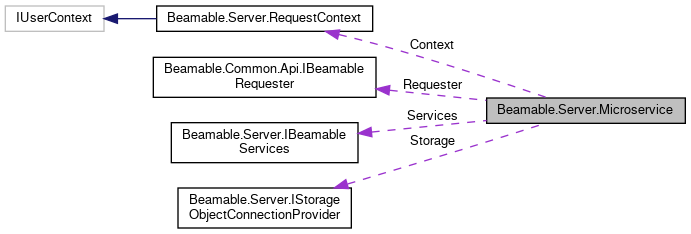This type defines the Microservice main entry point for the Microservice feature. More...


Public Member Functions | |
| void | ProvideContext (RequestContext ctx) |
| void | ProvideRequester (RequesterFactory requesterFactory) |
| void | ProvideServices (ServicesFactory servicesFactory) |
| void | ProvideDefaultServices (IServiceProvider provider, Func< RequestContext, IServiceProvider > scopeGenerator) |
Protected Member Functions | |
| RequestHandlerData | AssumeUser (long userId, bool requireAdminUser=true) |
| Build a request context and collection of services that represents another player. More... | |
Protected Attributes | |
| RequestContext | Context |
| This type defines the Microservice RequestContext. | |
| IBeamableRequester | Requester |
| This type defines the IBeamableRequester. | |
| IBeamableServices | Services |
| This type defines the Microservice main entry point for Beamable Microservice features. More... | |
| IStorageObjectConnectionProvider | Storage |
Detailed Description
This type defines the Microservice main entry point for the Microservice feature.
A microservice architecture, or "microservice", is a solution of developing software systems that focuses on building single-function modules with well-defined interfaces and operations.
Related Links
- See the Microservice feature documentation
- See Beamable.Server.IBeamableServices script reference

Member Function Documentation
◆ AssumeUser()
|
inlineprotected |
Build a request context and collection of services that represents another player.
This can be used to take API actions on behalf of another player. For example, if you needed to modify another player's currency, you could use this method's return object to access an IMicroserviceInventoryApi and make a call.
- Parameters
-
userId The user id of the player for whom you'd like to make actions on behalf of requireAdminUser By default, this method can only be called by a user with admin access token.
If you pass in false for this parameter, then any user's request can assume another user. This can be dangerous, and you should be careful that the code you write cannot be exploited.
- Returns
- A RequestHandlerData object that contains a request context, and a collection of services to execute SDK calls against.
Member Data Documentation
◆ Services
|
protected |
This type defines the Microservice main entry point for Beamable Microservice features.
Related Links
- See Beamable.Server.IBeamableServices script reference
The documentation for this class was generated from the following file:
- com.beamable.server/SharedRuntime/Microservice.cs